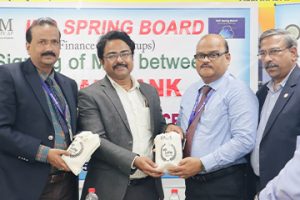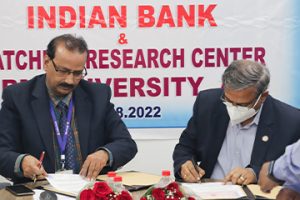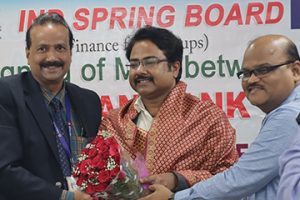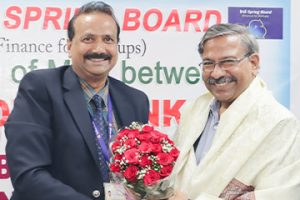BSc Psychology students to pursue Masters in the UK, US universities
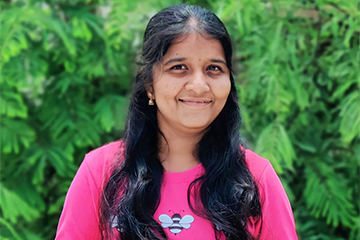 Sravani Govindu is proud to be a part of the first ever batch of Psychology from SRM University-AP. She is always amazed by the influence the faculty and friends had on her character development throughout the years. Sravani recollects how she was an unbothered soul without any focus before joining the university and what she became after experiencing the rhythm of the campus. During her university life, she recognised the value of having a sense of purpose. The continuous efforts from the faculty to provide the right amount of guidance and motivation will forever be a fuelling force in Sravani’s career. She is beyond grateful to the supportive academic community on the campus which became her backbone whenever she was uncertain. The value-oriented course structure at SRM AP encouraged her on many levels. Sravani adores the welcoming aura of the campus and the dynamics between students from various states and countries. She is ready to welcome a new chapter at Greenwich University while holding a bunch of memories from SRM AP.
Sravani Govindu is proud to be a part of the first ever batch of Psychology from SRM University-AP. She is always amazed by the influence the faculty and friends had on her character development throughout the years. Sravani recollects how she was an unbothered soul without any focus before joining the university and what she became after experiencing the rhythm of the campus. During her university life, she recognised the value of having a sense of purpose. The continuous efforts from the faculty to provide the right amount of guidance and motivation will forever be a fuelling force in Sravani’s career. She is beyond grateful to the supportive academic community on the campus which became her backbone whenever she was uncertain. The value-oriented course structure at SRM AP encouraged her on many levels. Sravani adores the welcoming aura of the campus and the dynamics between students from various states and countries. She is ready to welcome a new chapter at Greenwich University while holding a bunch of memories from SRM AP.
 Meenu Roy is proud to be an SRMite and belongs to the first batch of Psychology at the University. She is in awe of the momentum her personality growth acquired from the eventful campus life. Clubs and other university activities helped her try things beyond her expectations. She enjoyed the whole process of exploring herself throughout the academic venture at SRM University-AP. She finds it fortunate to have a supportive academic ecosystem at her crucial career junction. Meenu is about to pursue her master’s degree from the University of Westminster, UK. Her admiration towards the faculty and friends she had at SRM AP grows further as she continues to go places and prove herself. A part of the campus life and wisdom she enjoyed at the university will stay with her for a lifetime while she keeps on adding value to the recognition of SRM University-AP with her academic intelligence.
Meenu Roy is proud to be an SRMite and belongs to the first batch of Psychology at the University. She is in awe of the momentum her personality growth acquired from the eventful campus life. Clubs and other university activities helped her try things beyond her expectations. She enjoyed the whole process of exploring herself throughout the academic venture at SRM University-AP. She finds it fortunate to have a supportive academic ecosystem at her crucial career junction. Meenu is about to pursue her master’s degree from the University of Westminster, UK. Her admiration towards the faculty and friends she had at SRM AP grows further as she continues to go places and prove herself. A part of the campus life and wisdom she enjoyed at the university will stay with her for a lifetime while she keeps on adding value to the recognition of SRM University-AP with her academic intelligence.
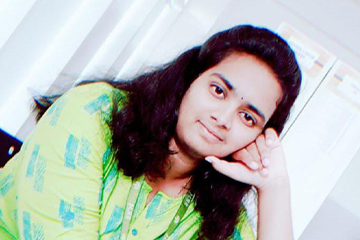 Uha Lakkireddy recently completed her bachelor’s degree in Psychology from SRM University-AP. The tremendous support and motivation from the university have helped her nurture self-confidence and self-satisfaction. Uha noticed how she transformed as an individual from the time of enrolling in the university until the time of graduation. As a psychology student, she was able to grasp several interesting theories which had exciting applications in real life. In-depth details included in the course structure assisted her in the most unexpected but necessary situations. Uha finds it very fascinating that the graduation period has essentially taught her some extremely valuable life lessons. She remembers learning the importance of physical activities in maintaining mental health through Sports Psychology. Uha’s journey as an ardent Clinical Psychology student is taking a huge turn from SRM AP to Greenwich University, UK. She gives all the credit to her faculty and peers, who have always encouraged her to work hard.
Uha Lakkireddy recently completed her bachelor’s degree in Psychology from SRM University-AP. The tremendous support and motivation from the university have helped her nurture self-confidence and self-satisfaction. Uha noticed how she transformed as an individual from the time of enrolling in the university until the time of graduation. As a psychology student, she was able to grasp several interesting theories which had exciting applications in real life. In-depth details included in the course structure assisted her in the most unexpected but necessary situations. Uha finds it very fascinating that the graduation period has essentially taught her some extremely valuable life lessons. She remembers learning the importance of physical activities in maintaining mental health through Sports Psychology. Uha’s journey as an ardent Clinical Psychology student is taking a huge turn from SRM AP to Greenwich University, UK. She gives all the credit to her faculty and peers, who have always encouraged her to work hard.
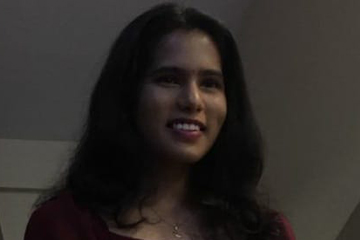 Chandrika Reddy from BSc Psychology at SRM University-AP is excited to continue her studies in Psychology to the next level (Post Graduation) at Adelphi University, New York. She is among the bright students who have secured admission to global universities abroad. Chandrika ecstatically mentioned the exposure she collected from the carefully laid out curriculum and course structure at SRM AP. Her journey as an SRMite was quite eventful. She had excellent professors, classmates, and friends who contributed equally to her growth. She had various opportunities to get engaged in the activities aligned with the coursework and re-establish her hobbies. Being a student of the first graduating batch of BSc Psychology, Chandrika’s achievement is a motivation to all students. She thanked all the professors and peers for their kind support and encouragement throughout this journey.
Chandrika Reddy from BSc Psychology at SRM University-AP is excited to continue her studies in Psychology to the next level (Post Graduation) at Adelphi University, New York. She is among the bright students who have secured admission to global universities abroad. Chandrika ecstatically mentioned the exposure she collected from the carefully laid out curriculum and course structure at SRM AP. Her journey as an SRMite was quite eventful. She had excellent professors, classmates, and friends who contributed equally to her growth. She had various opportunities to get engaged in the activities aligned with the coursework and re-establish her hobbies. Being a student of the first graduating batch of BSc Psychology, Chandrika’s achievement is a motivation to all students. She thanked all the professors and peers for their kind support and encouragement throughout this journey.
- Published in Departmental News, News, Psychology News, Students Achievements
The future directions of WBAN technology
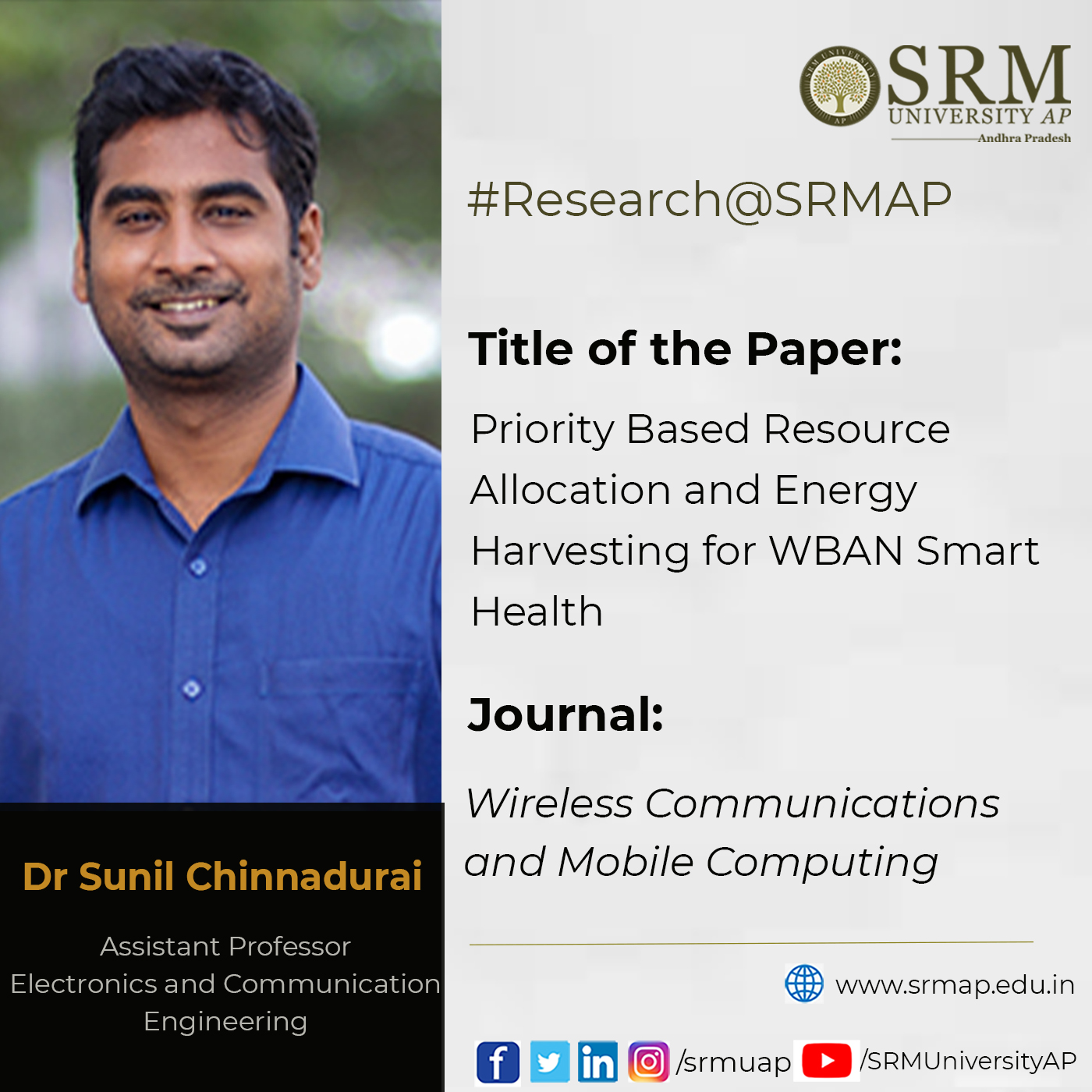 Integrated short-range wireless technologies are becoming the most sought-after machinery in recent years. The possibilities of its applications are expanding with the emergence of new health conditions and concerns. Assistant Professor of the Department of Electronics and Communication Engineering, Dr Sunil Chinnadurai’s recent research focuses on the future of this technology. His paper titled Priority Based Resource Allocation and Energy Harvesting for WBAN Smart Health got published in the journal Wireless Communications and Mobile Computing with Impact Factor 2.34. He worked with Dr Poongundran Selvaprabhu, Assistant Professor, Vellore Institute of Technology, for this project.
Integrated short-range wireless technologies are becoming the most sought-after machinery in recent years. The possibilities of its applications are expanding with the emergence of new health conditions and concerns. Assistant Professor of the Department of Electronics and Communication Engineering, Dr Sunil Chinnadurai’s recent research focuses on the future of this technology. His paper titled Priority Based Resource Allocation and Energy Harvesting for WBAN Smart Health got published in the journal Wireless Communications and Mobile Computing with Impact Factor 2.34. He worked with Dr Poongundran Selvaprabhu, Assistant Professor, Vellore Institute of Technology, for this project.
Abstract
With the emergence of new viral infections and the rapid spread of chronic diseases in recent years, the demand for integrated short-range wireless technologies is becoming a major bottleneck. Implementation of advanced medical telemonitoring and telecare systems for on-body sensors needs frequent recharging or battery replacement. This paper discusses a priority-based resource allocation scheme and smart channel assignment in a wireless body area network capable of energy harvesting. The project investigates the researcher’s transmission scheme in regular communication, where the access point transmits energy and command while the sensor simultaneously sends the information to the access point. A priority schedule non-pre-emptive algorithm to keep the process running for all the users to achieve the maximum reliability of access by the decision-maker or hub during critical situations for users has been proposed. During an emergency or critical situation, the process does not stop until the decisionmaker, or the hub takes a final decision. The objective of the proposed scheme is to get all the user processes executed with minimum average waiting time and no starvation. By allocating a higher priority to emergencies and on data traffic signals such as critical and high-level signals, the proposed transmission scheme avoids inconsistent collisions. The results demonstrate that the proposed scheme significantly improves the quality of the network service in terms of data transmission for higher priority users.
Explanation of the research
A priority scheduling non-pre-emptive algorithm with SCA for WBAN smart health is proposed. The potential advantage of this algorithm is to keep on running the process for all users to attain maximum reliability until all the processes are executed. The data traffic associated with the priority scheduling non-pre-emptive algorithm is categorised into four major sub classes, namely, emergency, on-demand, normal, and non-medical data signals in order to assist the different QoS requirements. The results indicate that the priority scheduling non-pre-emptive algorithm performs during emergency and on-demand signals compared to the novel priority-based channel access algorithm for contention-based MAC (NPCA-MAC), low-rate wireless personal area networks (LR- WPAN), and priority-based adaptive schemes.
WBAN is a precise technology requiring frequent recharging or battery replacement. During the emergency or critical rescue situation, the highest priority user information is processed with minimum service delay without compromising the QoS. In addition, the proposed method prioritises the sensor nodes and classifies data traffic into emergency- (highest priority-), on-demand- (minimum priority-), normal (lowest priority-), and nonmedical- (normal-) based applications.
The future directions of WBAN are dealing with smart WBAN healthcare, trust management, trust negotiation, data security, uninterrupted lifetime, and intelligent decision-making (enhance the predictions from prior information) processes.
- Published in Departmental News, ECE NEWS, News, Research News
Mr Shaik Rajak attended the SERB-funded workshop on vehicular communication
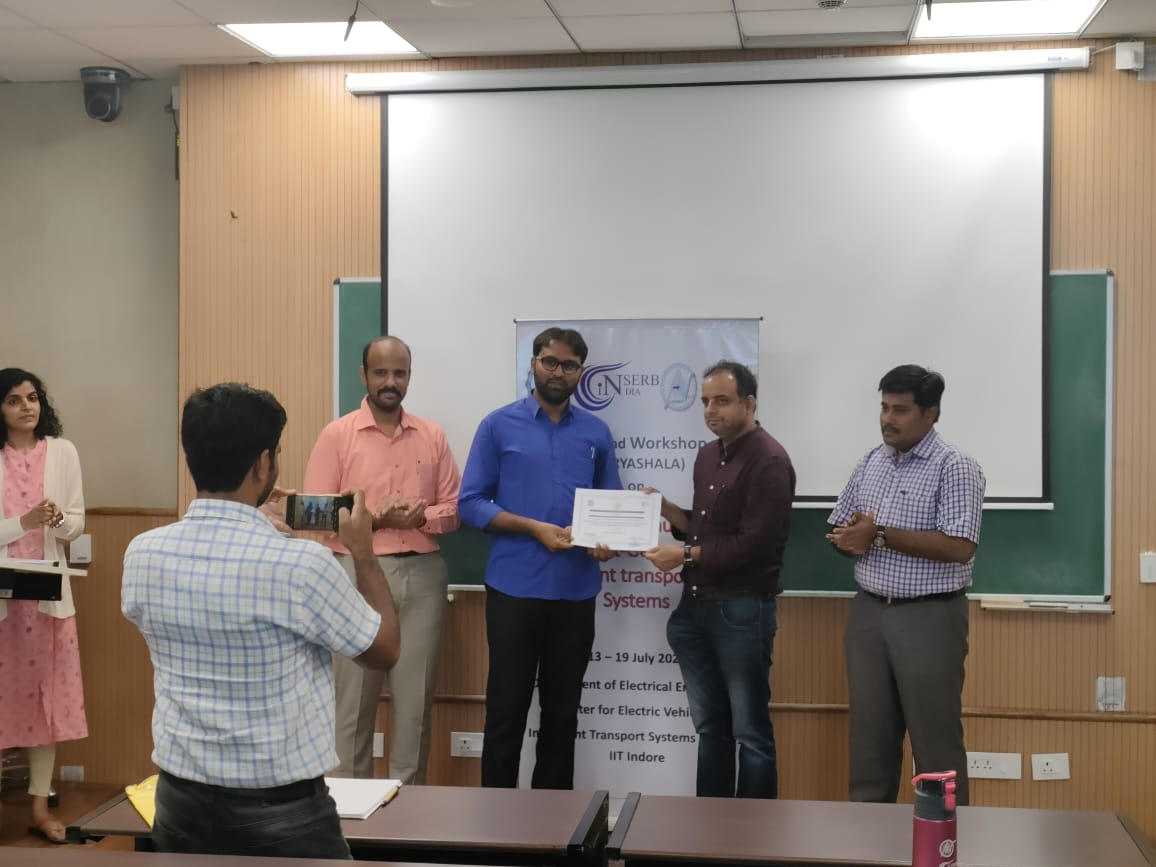
The students of SRM University-AP leave no stone unturned to expand their knowledge horizons and strengthen their research endeavours as they are trained to translate every single experience into lessons of learning fortifying their perpetual journey as researchers, teachers, or entrepreneurs. The university facilitates them to explore all possibilities of learning paving their way to becoming complete professionals. They are encouraged to partake in numerous activities such as seminars, conferences, and workshops happening within and outside the country.
It is a cause for pride to know that one of our PhD scholars, Mr Shaik Rajak from the Department of Electronics and Communication Engineering, working under the guidance of Dr Sunil Chinnadurai, has attended the prestigious Science and Engineering Research Board (SERB) funded High-end Workshop on Vehicular Communications for Next-Generation Intelligent Transportation Systems conducted at IIT Indore. Mr Rajak was one of the few participants who was invited to attend the workshop based on his merit and research publications out of 300+ applications received from all over the country.
The workshop deliberated upon the future of the transportation industry of the country. The present transportation infrastructure demands efficient intelligent transportation systems (ITS) because of the increasing population, traffic congestion, etc. Vehicular communication is a key enabler for the next-generation ITS applications such as platooning, remote vehicle monitoring, etc. The fundamentals of vehicular communication systems along with advanced coding techniques, modelling of vehicular channels, various radio access technologies for next-generation ITS, connected and automated vehicles, unmanned aerial vehicle (UAV) communication, ITS standardization activities, vehicular Internet-of-Things (IoT) networks, and advanced network security techniques specific to vehicular networks were discussed in the meeting.
The workshop immensely helped Mr Rajak to learn more about his research areas; the advancements in the field of intelligent transportation systems, the current challenges, and a few research directions to solve the existing problems. “I could meet with many speakers and participants from various IITs, NITs and other central universities and get involved in enriching discussions,” he said. “The hands-on sessions also gave a better perspective on the existing knowledge base” added Mr Rajak. The workshop augmented his research outlook on ITS, vehicular channels: its characterisation and modelling, advanced coding techniques in vehicular communications, and vehicular IoT networks in real-time scenarios. He marked his gratitude to SRM University-AP for granting him an opportunity to be part of the high-end workshop.
- Published in Departmental News, ECE NEWS, News, Students Achievements
Exploring the charge transport across protein-based molecular junctions
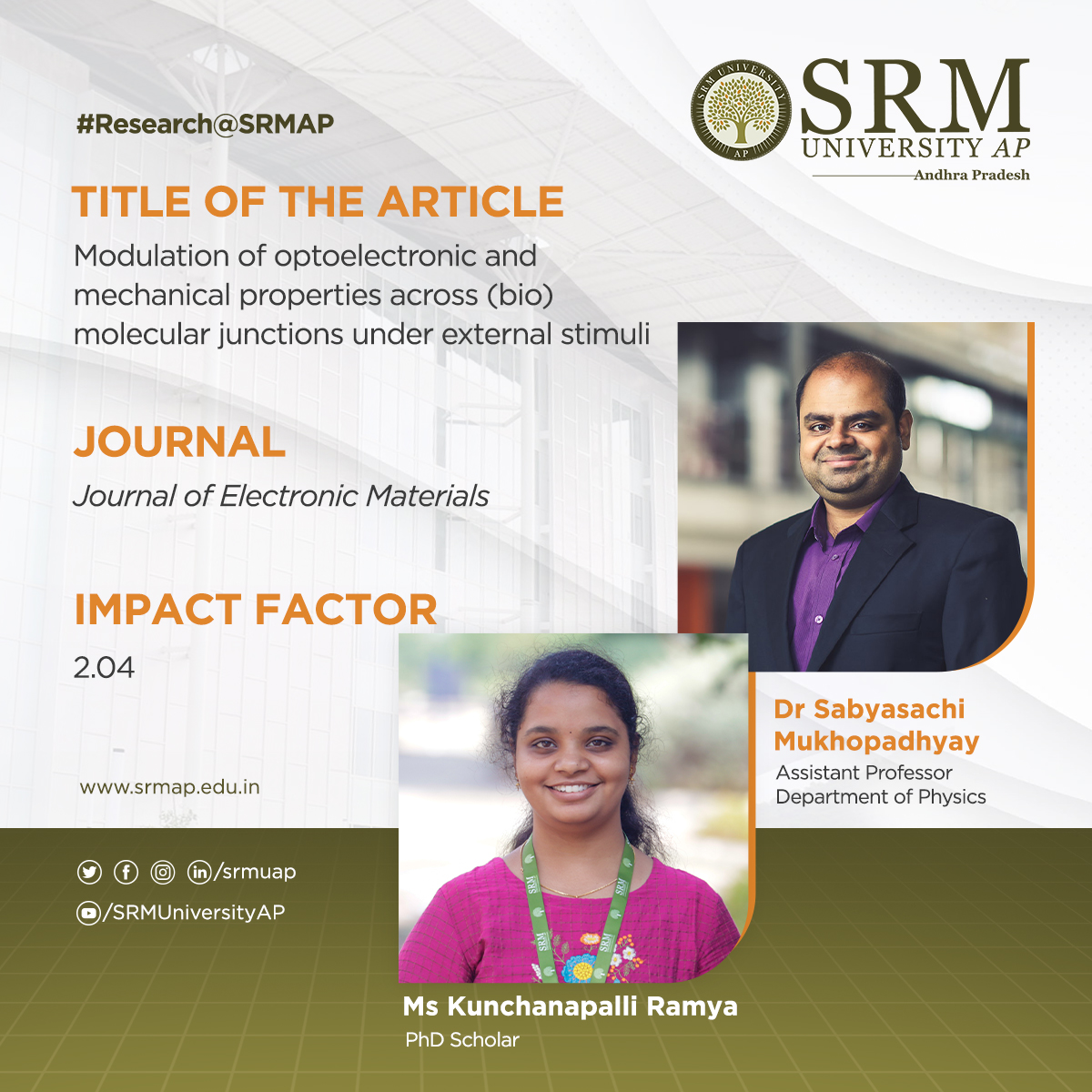 The latest research at the Department of Physics is investigating the charge transport across protein-based molecular junctions. Researchers envision fabricating bio- FETs which is useful in electronic devices as an alternative to Si- technology. Assistant Professor Dr Sabyasachi Mukhopadhyay and his PhD scholar Kunchanapalli Ramya published their paper Modulation of optoelectronic and mechanical properties across (bio) molecular junctions under external stimuli in the journal of Electronic Materials with an impact factor 2.04.
The latest research at the Department of Physics is investigating the charge transport across protein-based molecular junctions. Researchers envision fabricating bio- FETs which is useful in electronic devices as an alternative to Si- technology. Assistant Professor Dr Sabyasachi Mukhopadhyay and his PhD scholar Kunchanapalli Ramya published their paper Modulation of optoelectronic and mechanical properties across (bio) molecular junctions under external stimuli in the journal of Electronic Materials with an impact factor 2.04.
Abstract
Molecular junctions are formed by wedging molecules between two metal electrodes. Besides the conventional parameters of the metal-molecule-metal junction, such as the work function of electrodes and the molecules’ energy gap, molecule-electrode electronic coupling strength also plays a vital role in modulating the electronic properties of the molecular junction under external stimuli. We have also calculated several transport parameters which play a crucial role in finding the origin of conductance modulation under the external stimuli. We could find that before particular humidity conditions, the modulation in the conductance is due to the variation in coupling strength, which is due to the modulation in the electrostatic environment of retinal chromophores of protein by changing the structure of protein under various external stimuli.
Researchers have explored the external stimuli (illumination, force, and humidity conditions) effect on charge transport across bacteriorhodopsin-based molecular junctions. Their future research plans include bio- FET fabrication with the protein reported and studying the transistor characteristics across it.
- Published in Departmental News, News, Physics News, Research News
Dr Ghanshyam Kumar Pandey to join the Editorial Board of SN Business and Economics
SN Business and Economics is a multidisciplinary journal that covers the areas of Economics, Finance, Business, and Management. Springer publishes the journal. It is supported by a team of experienced in-house editors and an international Editorial board. Recently, Assistant Professor Dr Ghanshyam Kumar Pandey from the Department of Economics was appointed as a member of the editorial board of SN Business and Economics.
He is responsible for providing feedback on an ad hoc basis to the in-house editors. He is in charge of verifying submitted papers’ suitability for external review. All SN Business and Economics editors work together to ensure that the submitted research is expertly handled. The team assesses and confirms the paper to be technically sound, academically valid, and ultimately suitable for publication.
Dr Ghanshyam Kumar Pandey will be the handling Editor for up to 3 papers per quarter. This involves nominating academic referees and making an editorial recommendation following peer review. When requested, he shall give the editorial policy or strategy feedback to the Editorial team. Initially, his tenure will last for one year.
- Published in Departmental News, Economics Current Happenings, Economics News, Faculty Achievements, News
Combining intelligent systems for social good
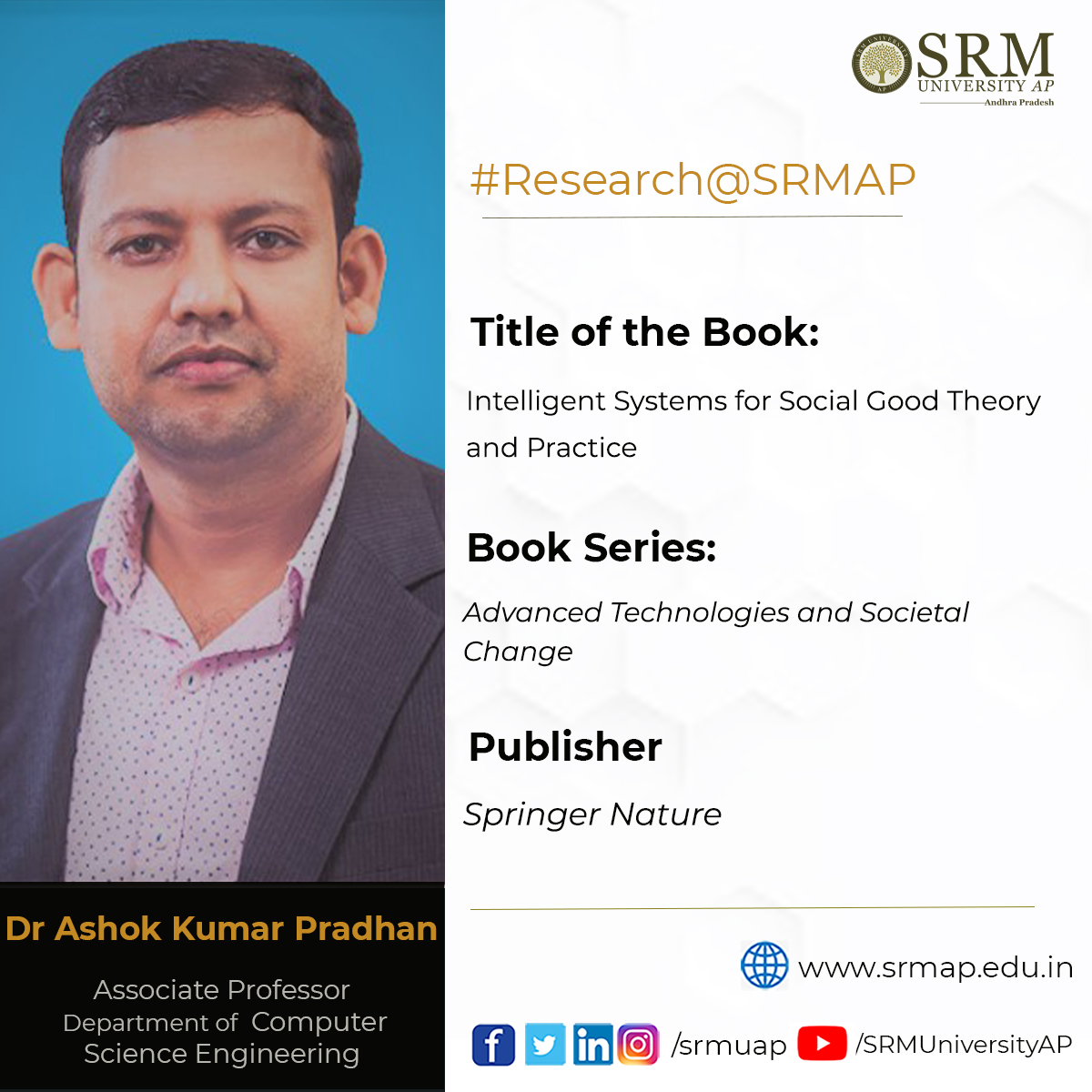 Merging the calibre of two well-fledged technologies will massively impact the momentum of social life. Decoding the possible links between promising technologies would employ solutions to various societal issues. Dr Ashok Kumar Pradhan, Associate Professor of the Department of Computer Science and Engineering, gave life to this thought by publishing a book titled Intelligent Systems for Social Good Theory and Practice. He published this work as an editor in a book series named Advanced Technologies and Social Change by Springer Nature.
Merging the calibre of two well-fledged technologies will massively impact the momentum of social life. Decoding the possible links between promising technologies would employ solutions to various societal issues. Dr Ashok Kumar Pradhan, Associate Professor of the Department of Computer Science and Engineering, gave life to this thought by publishing a book titled Intelligent Systems for Social Good Theory and Practice. He published this work as an editor in a book series named Advanced Technologies and Social Change by Springer Nature.
The book highlights the connection between the two technologies: Artificial intelligence (AI) and the Internet of Things (IoT). It shows the better impact of the relation between these technologies in society, using real-world examples. Each chapter in the book proposes novel solutions to societal problems along with the challenges in the application of AI and IoT to solve them. The adverse attacks on Machine Learning models and how to protect sensitive data over the IoT network are discussed in the book.
The book is significant to Dr Ashok Kumar Pradhan as applying the two technologies mentioned helps resolve various social problems related to healthcare, agriculture, green environment, renewable energies, smart cities, etc.
Shyamapada Mukherjee and Naresh Babu Muppalaneni from NIT Silchar and Sukriti Bhattacharya from Luxembourg Institute of Science and Technology, Belvaux, have worked together with Dr Ashok for this work. The book’s target audience is undergraduate, master’s, and doctoral students from Science and Engineering backgrounds.
- Published in CSE NEWS, Departmental News, News, Research News
Dr Divya Chaturvedi to join as a special issue guest editor at Hindawi
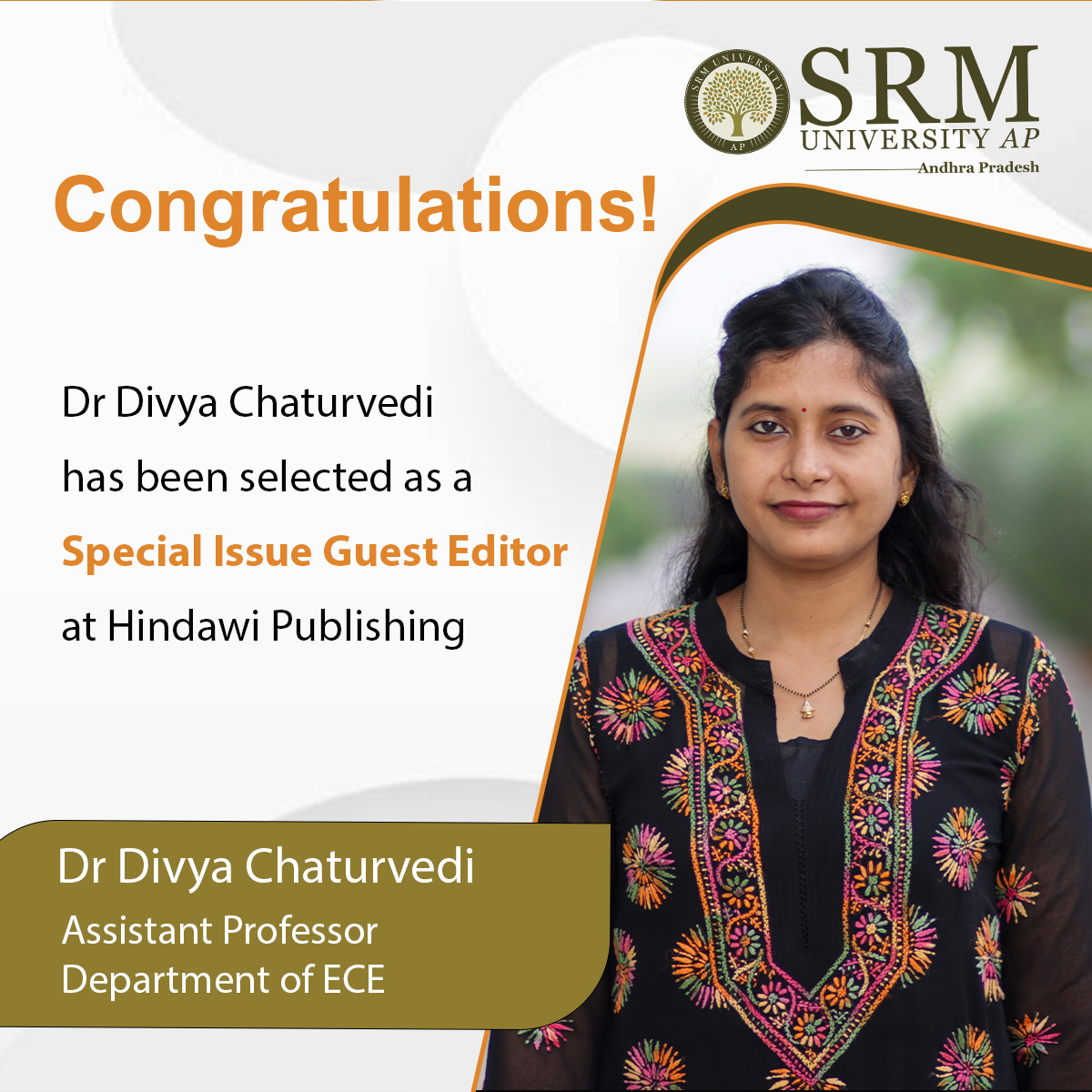
It is a matter of incredible honour to SRM University-AP, for Dr Divya Chaturvedi, Assistant Professor, Department of Electronics and Communication Engineering has been chosen as a special issue guest editor at Hindawi, one of the world’s largest publishers of peer-reviewed, fully open access journals of scientific, technical, and medical literature. Dr Divya has been keenly pursuing the umpteen possibilities of substrate integrated waveguide based cavity backed antennas, leaky wave antennas, wearable antennas for medical applications, and Multi-Input Multi-Output (MIMO) for 5G communication since the beginning of her career. And her research genius has bestowed her with numerous awards and recognitions over these years.
As a guest editor for Hindawi, Dr Divya would be responsible for the special issues “Substrate Integrated Waveguide (SIW) Based Circuits and Systems” and “The Future of Wireless Communications Systems: 5G and beyond” from the journals: International Journal of Antennas and Propagation and Journal of Computer Networks and Communications respectively. While the former aims to publish outstanding papers presenting cutting-edge advances in the field of microwave and millimetre-wave circuits and systems, the recent technological advancements in wireless communication systems will be focused in the latter.
Having served as the reviewer and member of various editorial boards and conferences, Dr Divya comes with a wealth of experience to put her expertise for the advancement of the publication. At Hindawi, she gets to work with a strong team of editors and network with like-minded colleagues around the world. ”It is truly fascinating to be a part of the Hindawi editorial board. The influential network that we build here could provide leads on professional opportunities or introduce us to new contacts in our discipline”, she remarked. This would also give her the liberty to handle manuscripts close to her professional interests and exert her creativity in the inception and development of a topic. The tenure of her role as an editor is expected to last for twelve months.
- Published in Departmental News, ECE NEWS, Faculty Achievements, News
Sustainable strategies for solid waste management
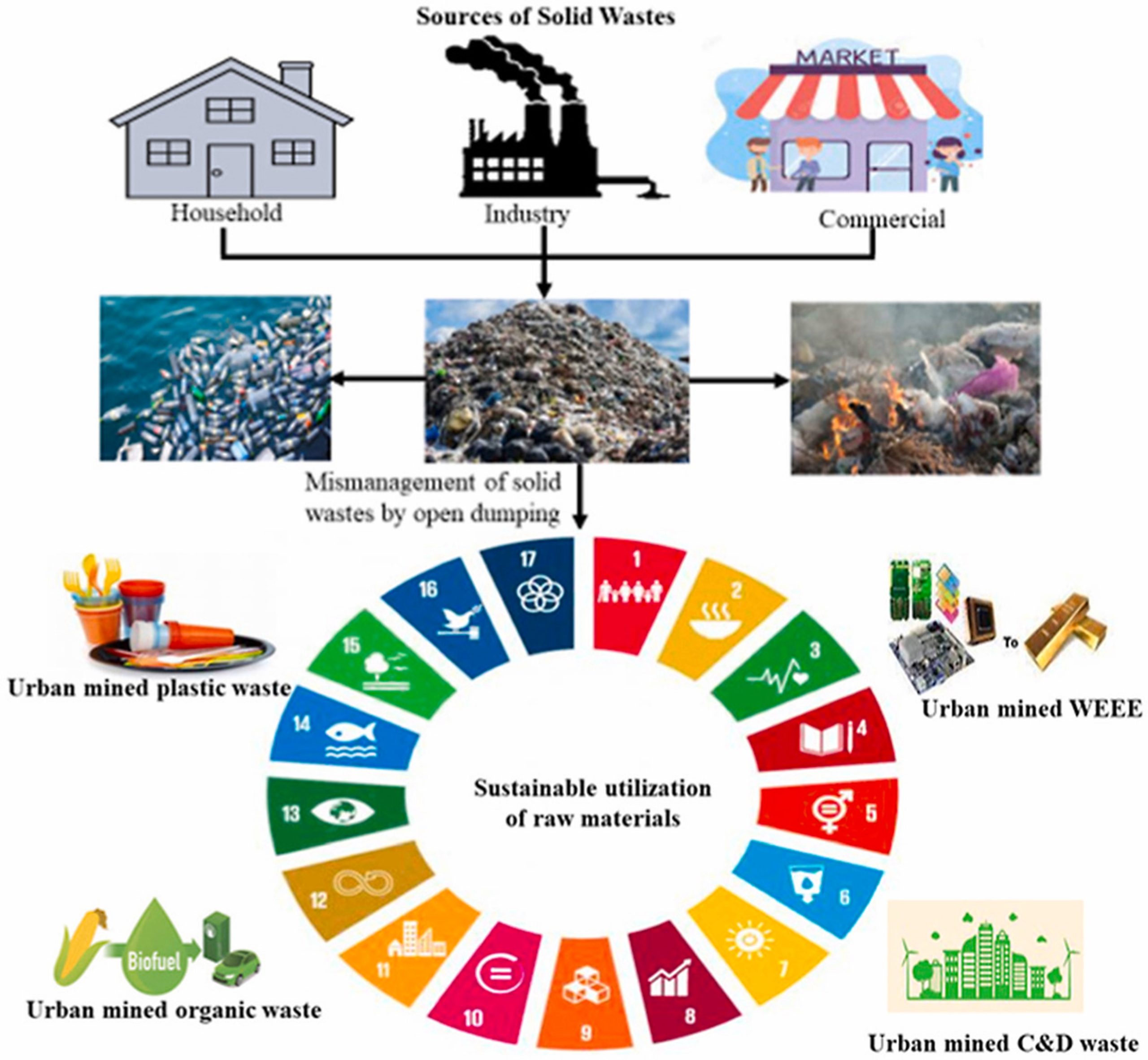 Dr Pankaj Pathak from the Department of Environmental Science has been keenly involved in research studies involving solid waste management and the effective conversion of wastes to energy. Her latest research publication Sustainable approach for valorization of solid wastes as a secondary resource through urban mining proposes an enhanced solution for the sustainable management of different types of solid wastes. It was published in the Journal of Environmental Management with an impact factor 8.98.
Dr Pankaj Pathak from the Department of Environmental Science has been keenly involved in research studies involving solid waste management and the effective conversion of wastes to energy. Her latest research publication Sustainable approach for valorization of solid wastes as a secondary resource through urban mining proposes an enhanced solution for the sustainable management of different types of solid wastes. It was published in the Journal of Environmental Management with an impact factor 8.98.
In this paper, sustainable alternative valorisation techniques that aid in maximum recovery from waste materials, and associated challenges and limitations have been highlighted. These solid wastes mainly include construction and demolition wastes, organic food wastes, plastic, and WEEE (Waste electrical and electronic equipment) from various sources. In order to overcome these challenges, a sustainable circular model is recommended in this paper that will help minimise the negative environmental impacts, maximise the life cycle of material, reduce the consumption of fossil fuels, and thereby sustainably manage waste. Implementation of this recommendation can help in achieving the target of sustainable development goals (SDGs).
The article was published in collaboration with her PhD Scholar MSSR Tejaswini, and D.K. Gupta, Member Secretary in the Hazardous Substance Management Division in the Ministry of Environment, Forest and Climate Change, New Delhi.
Abstract
The incessant population has increased the production and consumption of plastics, paper, metals, and organic materials, which are discarded as solid waste after their end of life. The accumulation of these wastes has created growing concerns all over the world. However, conventional methods of solid waste management i.e., direct combustion and landfilling have caused several negative impacts on the environment (releasing toxic chemicals and greenhouse gases, huge land use) besides affecting human health. Therefore, it is requisite to determine sustainable alternative technologies that not only help in mitigating environmental issues but also increase the economic value of the discarded solid wastes. This process is known as urban mining where waste is converted into secondary resources and thereby conserves the natural primary resources. Thus, this review highlights the technological advancements in the valorisation process of discarded wastes and their sustainable utilization. We also discussed several limitations of the existing urban mining processes and further the feasibility of valorisation techniques was critically analysed from a techno-economical perspective. This paper recommends a novel sustainable model based on the circular economy concept, where waste is urban mined and recovered as a secondary resource to support the united nations sustainable development goals (SDGs). The implementation of this model will ultimately help the developing countries to achieve the target of SDGs 11, 12, and 14.
- Published in Departmental News, ENVS News, News, Research News
Charge transfer in photoexcited cesium lead halide perovskite nanocrystals

The Department of Chemistry is glad to announce that Assistant Professor Dr Nimai Mishra and his research group Manoj Palabathuni, Syed Akhil, and Rahul Singh have published an article titled “Charge Transfer in Photoexcited Cesium Lead Halide Perovskite Nanocrystals: Review of Materials and Applications” in the Q1 journal “ACS Applied Nano Materials ” published by The American Chemical Society. The journal has an Impact Factor of 6.14.
Cesium Lead Halide (CsPbX3) perovskite nanocrystals (PNCs) have attracted significant views from researchers due to their essential optoelectronic properties, especially long charge carrier transfer, high efficiency in visible light absorption, and long excited states lifetime, etc. Because of these properties, these materials exhibit outstanding charge transfer and charge separation, which enables them for solar cell applications. Recently, cesium lead halide perovskites have emerged as photocatalysts. In photovoltaics or photocatalysis, upon photoexcitation, the exciton dissociates, and the electron/hole is transmitted from the conduction/valance bands to the electron/hole acceptors. Therefore, it is essential to understand how the charge transfer occurs at the PNCs interface, which can help the researcher maximize the output in solar cells and photocatalytic efficiency.
In this article, Dr Mishra’s research group has outlined different charge transfer dynamics based on critical factors and discussed their optoelectronic properties. Electron/hole transfer dynamics are the most concerning characteristic; thus, they reviewed the relevant literature that reported efficient electron/hole transfer performance. In the end, they highlighted the recent development of the use of perovskite nanocrystal as photocatalyst in organic synthesis.
- Published in Chemistry-news, Departmental News, News, Research News
Indian Bank inks MoU with SRM University-AP to lend up to 50 Cr for start-ups
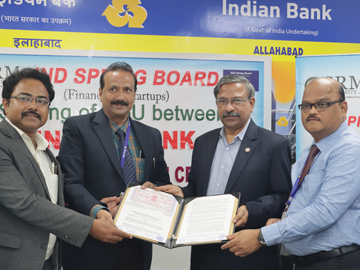
Indian Bank has collaborated with Hatchlab Research Centre, TBI of SRM University-AP to launch ‘IND Spring Board’, an initiative for financing start-ups and MSMEs. The bank will extend loans of up to Rs. 50 crore to start-ups incubated at SRM Hatchlab for their working capital requirements or purchase of machinery and equipment. This collaboration is one of its kind in the state of Andhra Pradesh.
Introducing the ventures at Hatchlab Research Centre, which will be availing of the Ind Spring Board scheme, Mr Udayan Bakshi, Associate Director – Entrepreneurship, Department of Entrepreneurship and Innovation, highlighted the successful student ventures from SRM University-AP that has crossed 1Cr turnover. “SRM AP actively engage in business through the local community. This collaboration will further strengthen the MSME sector,” stated University Registrar Dr R Premkumar, signing the MoU.
Speaking on the occasion, Sri N K Sharma GM – MSME Indian Bank expressed his delight in collaborating with SRM University-AP along with other premier institutes like IITs and IIMs across the country. Sri C D Ramarao – Zonal Manager, Indian Bank, Guntur, described the genesis of the Ind Spring Board project and said Andhra Pradesh has a start-up-friendly ecosystem to nurture innovations.
Hatchlab Research Centre – the technology and livelihood business incubator of SRM University-AP facilitates the incubation of student startups. 10,000+ sq. ft., state-of-the-art incubator space and Seed Funding are provided to eligible student ventures. 40+ student startups, 200+ industry mentors, and $120,000 angel investment are peculiar to the conducive entrepreneurial environment of SRM University-AP. The alum entrepreneurial venture Oureye.ai received an additional investment of $50,0000. Integrating global vision and grassroots connect, the entrepreneurship-based clubs and activities like Socio Impacto, Explorer Hive, Saurvi, Research Clan, etc., are vital elements of SRM E-cell. The university further promotes student-run labs such as Next-Tech Lab and Ennovab, where students share their ideas to curate those into applications that benefit society.
Sri C Jagan Mohan Rao – Deputy Zonal Manager, Sri Raghavendra – Senior Manager, Sri Satya Dev-Branch Manager, Sri M S Sagar – Chief Manager and Jaya Prakash Narayana – Head of International Collaboration & PR – Hatchlab Research Centre were also present on the occasion.
- Published in Departmental News, IDEA NEWS, MoU, News


